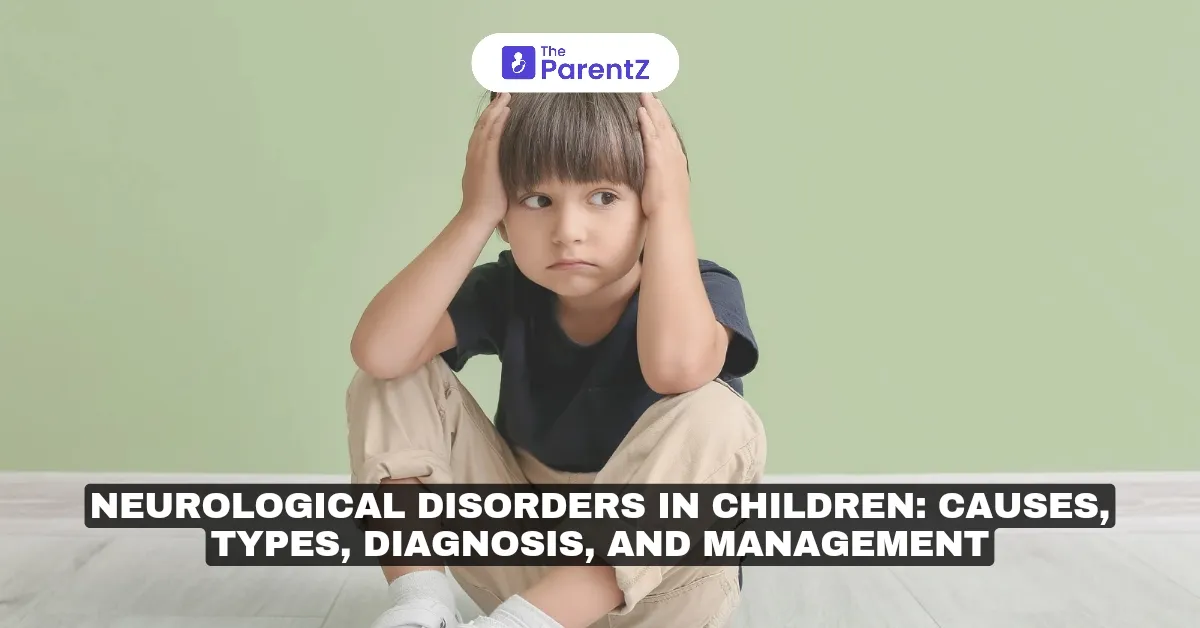Neurological disorders in children are conditions that affect the brain, spinal cord, and nervous system. These disorders can impact a child’s physical, emotional, and cognitive development. Early diagnosis and intervention are crucial to improving outcomes and providing a better quality of life for affected children.
Common Neurological Disorders in Children
1. Cerebral Palsy (CP):
• What It Is: A group of disorders affecting movement, muscle tone, and posture.
• Symptoms: Delayed motor milestones, muscle stiffness, or floppy muscles.
• Cause: Brain damage during pregnancy, birth, or early childhood due to infections, lack of oxygen, or trauma.
2. Epilepsy:
• What It Is: A neurological condition characterized by recurrent seizures.
• Symptoms: Sudden, uncontrolled electrical activity in the brain leading to convulsions, staring spells, or loss of awareness.
• Cause: Genetic factors, brain injury, or infections like meningitis.
3. Autism Spectrum Disorder (ASD):
• What It Is: A developmental disorder affecting social interaction, communication, and behavior.
• Symptoms: Difficulty in social engagement, repetitive behaviors, and sensory sensitivities.
• Cause: The exact cause is unknown, but genetic and environmental factors are involved.
4. Attention-Deficit/Hyperactivity Disorder (ADHD):
• What It Is: A disorder affecting attention, impulsivity, and hyperactivity.
• Symptoms: Trouble focusing, restlessness, and difficulty following instructions.
• Cause: Likely a combination of genetic, environmental, and neurological factors.
5. Muscular Dystrophy (MD):
• What It Is: A group of genetic disorders causing muscle weakness and degeneration.
• Symptoms: Difficulty walking, frequent falls, and muscle stiffness.
• Cause: Mutations in genes that produce proteins needed for muscle function.
6. Hydrocephalus:
• What It Is: Accumulation of cerebrospinal fluid in the brain, leading to increased pressure.
• Symptoms: Enlarged head size, vomiting, irritability, and developmental delays.
• Cause: Congenital defects, infections, or trauma.
7. Tourette Syndrome:
• What It Is: A condition involving repetitive, involuntary movements or vocalizations (tics).
• Symptoms: Motor tics (blinking, shrugging) or vocal tics (grunting, repeating words).
• Cause: The exact cause is unclear but likely involves genetic and neurological factors.
8. Neurodegenerative Disorders:
• Examples: Tay-Sachs disease, Batten disease.
• Symptoms: Progressive loss of motor skills, vision, and cognitive function.
• Cause: Genetic mutations affecting the nervous system’s functionality.
Symptoms to Watch For
Parents should look out for these warning signs:
• Delayed milestones like walking or speaking.
• Recurrent seizures or unusual movements.
• Poor coordination or muscle stiffness.
• Difficulty focusing, behavioral changes, or learning difficulties.
• Abnormal head size or shape.
Incidence of Neurological Disorders in Children
• Global Statistics: About 5-10% of children worldwide are affected by some form of neurological disorder. Autism spectrum disorder alone affects 1 in 36 children globally.
• Indian Context: The prevalence of neurological disorders in children in India is estimated at 10%, with epilepsy and cerebral palsy being the most common.
Diagnosis of Neurological Disorders
Accurate diagnosis involves a multidisciplinary approach:
1. Medical History: Assess family history and prenatal, perinatal, and developmental history.
2. Neurological Examination: Evaluate motor skills, reflexes, and sensory responses.
3. Imaging Tests: MRI, CT scans, or EEG to identify structural or functional abnormalities.
4. Genetic Testing: Identifies hereditary neurological conditions.
5. Behavioral Assessments: Useful for conditions like autism or ADHD.
Management of Neurological Disorders
1. Medical Treatment:
• Medications for seizures, spasticity, or hyperactivity.
• Surgical interventions in severe cases (e.g., shunts for hydrocephalus, epilepsy surgery).
2. Therapies:
• Physical Therapy: Improves muscle strength and motor skills.
• Occupational Therapy: Focuses on daily living activities and fine motor skills.
• Speech Therapy: Helps with communication challenges.
3. Special Education Programs:
• Tailored learning strategies for children with developmental or cognitive challenges.
4. Behavioral Interventions:
• Techniques to manage ADHD, autism, and emotional difficulties.
5. Psychological Support:
• Counseling for children and families to cope with emotional stress.
Prevention of Neurological Disorders
1. Prenatal Care:
• Regular check-ups, a balanced diet, and avoiding alcohol or tobacco during pregnancy.
2. Vaccinations:
• Protect against infections like meningitis or rubella that may lead to neurological complications.
3. Safety Measures:
• Prevent head injuries by using helmets and child-proofing homes.
4. Early Intervention:
• Address developmental delays promptly with expert guidance.
When to Consult a Specialist
Parents should seek help from the following experts:
• Pediatric Neurologist: For diagnosis and treatment of neurological disorders.
• Developmental Pediatrician: For conditions affecting milestones and behavior.
• Therapists: Physical, occupational, or speech therapists, depending on the child’s needs.
• Genetic Counselor: If a hereditary disorder is suspected.
A Note for Parents
Caring for a child with a neurological disorder can be challenging, but remember that with timely intervention and the right support, children can achieve remarkable progress. Focus on the positives, celebrate small victories, and trust that things can and will improve.
Every child is unique, and with your unwavering support, they can overcome obstacles and thrive.
Conclusion
By understanding neurological disorders in children, parents can take proactive steps toward diagnosis, treatment, and long-term management, ensuring the best possible outcomes for their child.





Be the first one to comment on this story.